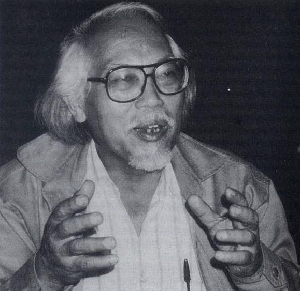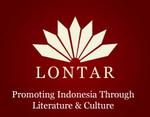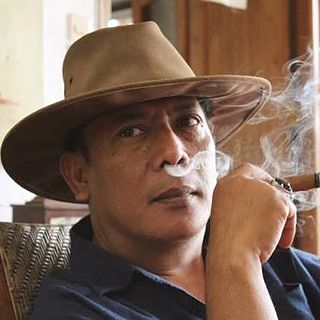Related Research Articles

Sapardi Djoko Damono was an Indonesian poet known for lyrical poems, and who was widely regarded as the pioneer of lyrical poetry in Indonesia. He died in South Tangerang, Banten on 19 July 2020 after a long illness.

Pramoedya Ananta Toer, also nicknamed Pram, was an Indonesian novelist and writer. His works span the colonial period under Dutch rule, Indonesia's struggle for independence, its occupation by Japan during the Second World War, as well as the post-colonial authoritarian regimes of Sukarno and Suharto, and are infused with personal and national history.

Goenawan Mohamad is an Indonesian poet, essayist, playwright and editor. He is the founder and editor of the Indonesian magazine Tempo. Mohamad is a vocal critic of the Indonesian government, and his magazine was periodically shut down due to its criticisms.
Subagio Sastrowardoyo was an Indonesian poet, short-story writer, essayist and literary critic. Born in Madiun, East Java, the Dutch East Indies, he studied at Gadjah Mada University, Cornell University and in 1963 graduated with an MA from Yale University. His debut as a writer came early with the publication of Simphoni (Symphony), a collection of poems, in 1957. The collection has been described as "cynical, untamed poetry, shocking sometimes". Simphoni was followed by several attempts at short story writing, including the publication Kedjananan di Sumbing, before Subagio settled on poetry as his main creative outlet. Following an extended stay in the United States he published a collection of poems entitled Saldju (Snow) in 1966. The poems in this collection deal with questions of life and death, and of the need for "something to hold on to in an existence threatened on all sides", and have been described as altogether more restrained than those in his earlier work. Additional works published since 1966 include Daerab Perbatasan (1970), Keroncong Motinggo (1975), Buku Harian (Diary), Hari dan Hara (1979)Simphoni Dua (1990), and several books of literary criticism. Subagio's collected poems have been published as Dan Kematian Makin Akrab (1995).

Yusuf Bilyarta Mangunwijaya, was an Indonesian architect, writer, and Catholic religious leader. He was popularly known as Romo Mangun.

The Lontar Foundation, a not-for-profit organization based in Jakarta, Indonesia, was founded in 1987 by four Indonesian writers: Goenawan Mohamad, Sapardi Djoko Damono, Umar Kayam, and Subagio Sastrowardoyo, and the American translator John H. McGlynn.

Laksmi Pamuntjak is an Indonesian novelist, poet, journalist and food critic based in Jakarta. In 2016, she won the LiBeraturpreis for the German translation of her debut novel, Amba/The Question of Red. In 2018, the movie adaptation of her second novel, Aruna dan Lidahnya, won two prizes at the Festival Film Indonesia. In 2020, her third novel, Fall Baby, won the Singapore Book Award for Best Literary Work. She also writes widely on culture and politics including for the Jakarta Post and the Indonesian newsmagazine Tempo, as well as international publications such as South China Morning Post and the Guardian.

Sitor Situmorang was an Indonesian poet, essayist and writer of short stories. Situmorang was born in Harianboho, North Sumatra, and educated in Jakarta. He worked as a journalist and literary critic in Medan, Yogyakarta and Jakarta for a variety of newspapers and periodicals.

Widji Thukul is an Indonesian poet and activist. His work is political, often critical of the Indonesian government and the social conditions of the country. He has been missing since 1998.

Hans Bague Jassin, better known as HB Jassin, was an Indonesian literary critic, documentarian, and professor. Born in Gorontalo to a bibliophilic petroleum company employee, Jassin began reading while still in elementary school, later writing published reviews before finishing high school. After a while working in the Gorontalo regent's office, he moved to Jakarta where he worked at the state publisher Balai Pustaka. After leaving the publisher, he attended the University of Indonesia and later Yale. Returning to Indonesia to be a teacher, he also headed Sastra magazine. Horison, a literary magazine, was started in July 1966 by Jassin and Mochtar Lubis as a successor to Sastra, and was edited by Taufiq Ismail, Ds. Muljanto, Zaini, Su Hok Djin, and Goenawan Mohamad. In 1971, Jassin was given a one-year prison sentence and a two-year probation period because as the editor of Sastra, he refused to reveal the identity of an anonymous writer who wrote a story which was considered by the court to be blasphemous.

Agam Wispi is an Indonesian poet.

Toeti Heraty was an Indonesian poet. She has been singled out as the "only woman amongst the leading contemporary Indonesian poets".
Ida Ayu Oka Rusmini, known as Oka Rusmini, is an Indonesian poet and novelist. She is a recipient of the S.E.A. Write Award.
Ismail Marahimin was an Indonesian writer. He was born in Medan, North Sumatra.

Ucu Agustin is an Indonesian journalist, writer, and documentary filmmaker.
Indonesian exile literature refers to works of Indonesian literature produced by writers living in exile after the 30 September Movement led an abortive coup d'état in 1965. This applies especially those living in Western Europe, with a focus on the Netherlands. Exile literature is not a literary school, but rather a literary incarnation of a unique political situation.
Andries Teeuw, better known as A. Teeuw in scholarly circles and Hans Teeuw to his friends, was a Dutch critic of Indonesian literature.
Harry Aveling is an Australian scholar, translator and teacher. He specialises in Indonesian and Malaysian literature, and Translation Studies. He received the degrees of Doctor of Philosophy in Malay Studies from the National University of Singapore and Doctor of Creative Arts (DCA) from the University of Technology, Sydney. Besides his academic writing, he has translated extensively from Indonesian and Malay, from Vietnamese Francophone literature, and also co-translated from Hindi. He has been awarded the Anugerah Pengembangan Sastra for his translation work. Aveling has two sons, a daughter and five granddaughters.

Sitok Srengenge is an Indonesian poet, actor, and dramatist. Born Sitok Sunarto in Purwodadi, Central Java, he became interested in literature at a young age and was heavily influenced by his village's strong oral tradition. When he moved to Jakarta to complete his university studies, he became involved with the Bengkel Teater under Rendra. Sitok remained with the company for almost a decade, appearing in several plays as he refined his literary style. His first poetry collection, Persetubuhan Liar, was published in 1992.
Leon Agusta was an Indonesian literary figure.
References
- 1 2 Cok Sawitri (January 1, 2009). "Womb". Words Without Borders. ISSN 1936-1459 . Retrieved January 26, 2012.
- ↑ Poernomo Gontha Ridho (December 10, 2003). "Duta Besar AS Sumbang Yayasan Lontar" [U.S. Ambassador donates to the Lontar Foundation]. Tempo (in Indonesian). ISSN 0126-4273. Archived from the original on April 1, 2004. Retrieved January 26, 2012.
- ↑ Vaudine England (May 30, 1996). "Keeping Their Words". Far Eastern Economic Review: 62. ISSN 0014-7591.
- ↑ "Translating Indonesia's Soul". The Kayon:The American Women's Association of Indonesia. 2011. pp. 28–29.
- ↑ Dion Hallpike (December 18, 2001). "Across the Great Divide". Tempo. ISSN 0126-4273. Archived from the original on April 1, 2004. Retrieved January 26, 2012.
- ↑ Stevie Emilia (April 22, 2008). "John McGlynn: Taking literature far and beyond". The Jakarta Post. Jakarta, Indonesia. p. 24.
- ↑ "John H. McGlynn: Promoting Indonesia through Literature". Tempo: 43. January 23–29, 2012. ISSN 0126-4273 . Retrieved February 2, 2012.